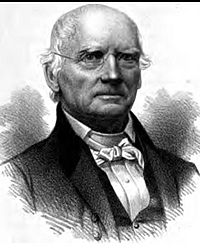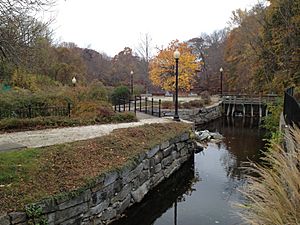Effingham Capron facts for kids
Quick facts for kids
Effingham Lawrence Capron
|
|
|---|---|

Effingham Lawrence Capron
|
|
| Born | January 1, 1791 Pomfret, Connecticut, United States
|
| Died | January 1, 1859 (aged 68) Worcester, Massachusetts, United States
|
| Occupation | Industrial manufacturer, textiles; anti-slavery activist |
| Known for | Textile pioneer, fiirst power looms for woolens in North America; Nationally known anti-slavery champion; assistedx fugitives on the Underground Railroad |
| Parent(s) | John C. Capron Sr. |
Effingham Lawrence Capron (1791–1859) was an important American leader. He was a Quaker, a mill owner, and a strong voice against slavery. He worked to end slavery before the Civil War. Capron was especially known in the Northeast United States for his anti-slavery efforts. He was born in Pomfret, Connecticut in 1791 and passed away in Worcester, Massachusetts in 1859. He was also a famous maker of cotton and wool fabrics during the early American Industrial period.

Effingham Capron: Early Life and Family Business
Effingham Lawrence Capron was born on March 29, 1791. His birthplace was Pomfret, Connecticut. His father, John Capron Sr., started the Capron mill. The family moved to Uxbridge, Massachusetts, around the time Effingham was born.
Effingham went to school in Uxbridge. He might have learned from Joshua Mason Macomber. Macomber ran the Uxbridge Academy in the same town. In 1820, Effingham, his brother John Willard Capron, and their father opened a woolen mill in Uxbridge. This mill was special because it was the first in America to use power looms for wool.
Fighting for Freedom: The Anti-Slavery Cause
Capron became a very dedicated abolitionist. This means he strongly believed in ending slavery. He led the local part of the Underground Railroad. The Underground Railroad was a secret network. It helped enslaved African Americans escape to freedom.
The Quaker Meeting house in Uxbridge was also important. It was home to another strong anti-slavery leader, Abby Kelley Foster. She even inspired Susan B. Anthony to join the fight against slavery.
With leaders like Effingham Capron and Abby Kelley Foster, Uxbridge became a key spot. It was a major stop on the Underground Railroad. It played a big role in helping enslaved people find freedom. A local historian called Capron a "liberator." He was more than just someone against slavery.
Under Effingham's leadership, the Uxbridge Anti-slavery Society grew. It had over 450 members. He became a state and national Vice President of anti-slavery groups. The Worcester area, including Uxbridge, was a center for the abolition movement in America.
Honoring a Hero: Capron Park
In 2012, Capron Park was rededicated to Effingham Capron. Senator Richard T. Moore of Uxbridge explained why. He said it was important to honor someone who fought against slavery. This was especially true during the 150th anniversary of the Civil War.
Legislation was passed to officially name the park after Effingham Capron. The park is located at Capron pond and falls. These falls were important. They provided water power for the start of the American Industrial Revolution. Capron Park is now part of the Blackstone Valley Heritage Park and Corridor. This is a National Historic Park in Massachusetts and Rhode Island.
 | Valerie Thomas |
 | Frederick McKinley Jones |
 | George Edward Alcorn Jr. |
 | Thomas Mensah |

